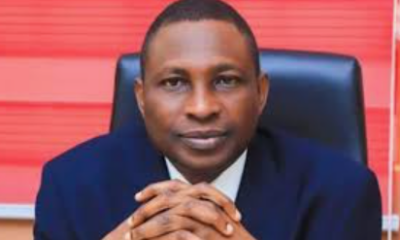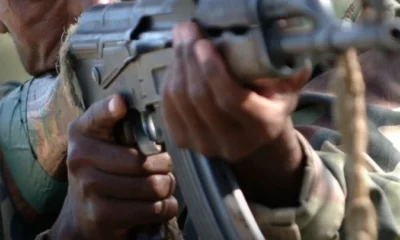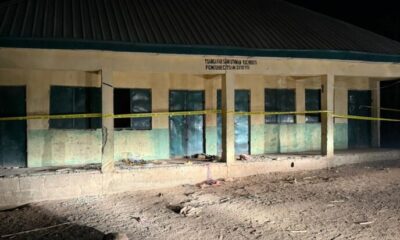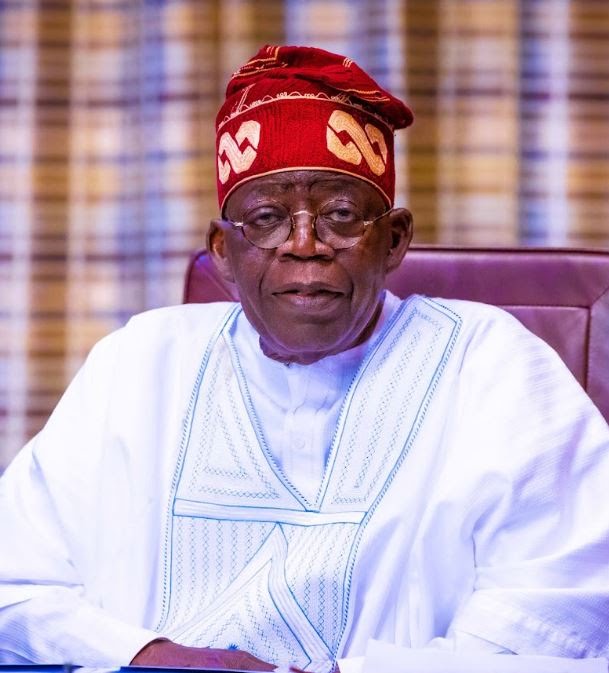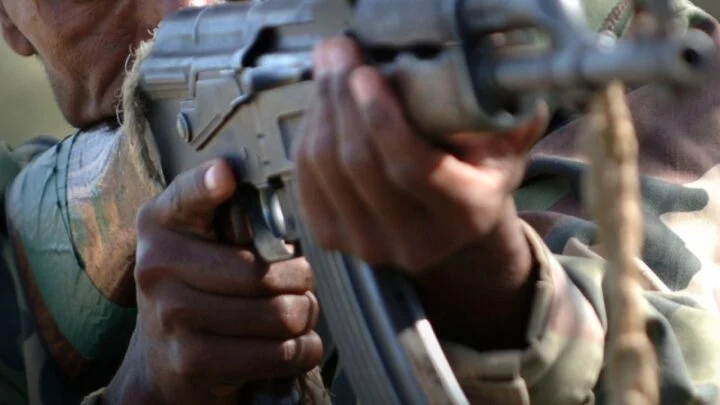Nigeria’s President, Asiwaju Bola Ahmed Tinubu, has ordered the Economic and Financial Crimes Commission (EFCC) to launch a full-blown investigation into the finances of the Ministry of Humanitarian Affairs and Poverty Alleviation.
Tinubu handed down the directive in a statement on Monday by his Special Adviser on Media and Publicity, Ajuri Ngelale, who also announced the suspension of the Minister of Humanitarian Affairs and Poverty Alleviation, Betta Edu, over the N585m scandal in the ministry.
The statement was titled ‘President Tinubu suspends Minister of Humanitarian Affairs and Poverty Alleviation from office.’
Edu’s suspension was happening as her predecessor, Sadiya Umar-Farouq, was grilled for about 12 hours by the EFCC detectives over the ongoing probe into the N37.1bn allegedly laundered during her tenure in office, through a contractor, James Okwete.
The ex-minister was questioned from 11am to 11pm by investigators seeking information on how the huge sum was allegedly laundered by top officials who served under her.
Data from the Budget Office indicate that the ministry, erstwhile known as Humanitarian Affairs, Disaster Management and Social Development, had a N2.38tn budget from 2020 to 2024.
In compliance with the presidential directive, the EFCC has also summoned Edu to appear before its detectives on Tuesday (today).
Ngelale in the statement said the President directed the EFCC Chairman, Ola Olukoyede, to conduct a thorough investigation into all aspects of the financial transactions involving the Federal Ministry of Humanitarian Affairs and Poverty Alleviation, as well as the agencies under it.
Furthermore, the President tasked a panel headed by the Coordinating Minister of the Economy and Minister of Finance, Wale Edun, to conduct a comprehensive diagnostic of the financial architecture and framework of the social investment programmes.
This was aimed at reforming the relevant institutions and programmes in a determined bid to eliminate all institutional frailties for the exclusive benefit of disadvantaged households and win back lost public confidence in the initiative.
The statement read, “In line with his avowed commitment to upholding the highest standards of integrity, transparency, and accountability in the management of the commonwealth of Nigerians, President Bola Tinubu suspends the Minister of Humanitarian Affairs and Poverty Alleviation, Dr. Betta Edu, from office with immediate effect.
“The suspended minister is hereby directed to hand over to the Permanent Secretary of the Federal Ministry of Humanitarian Affairs and Poverty Alleviation, and she is further directed by the President to fully cooperate with the investigating authorities as they conduct their investigation.
“Furthermore, the President has tasked a panel headed by the Coordinating Minister of the Economy and Minister of Finance to, among other functions, conduct a comprehensive diagnostic on the financial architecture and framework of the social investment programmes with a view to conclusively reforming the relevant institutions and programmes in a determined bid to eliminate all institutional frailties for the exclusive benefit of disadvantaged households and win back lost public confidence in the initiative. These directives of the President take immediate effect.’’
The scandal involving Edu burst open after a leaked memo revealed that the suspended minister directed the Accountant-General of the Federation, Oluwatoyin Madein, to transfer N585m to a private account owned by one Oniyelu Bridget, who the ministry claimed currently serves as the Project Accountant, Grants for Vulnerable Groups.
The minister had claimed that the N585m payment was meant for vulnerable groups in Akwa Ibom, Cross River, Ogun, and Lagos states, describing the allegations against her as baseless.
The Media Assistant to the minister, Rasheed Olarewaju, said in a statement that it was legal within the civil service for such payments to be made into private accounts of staff members, especially project accountants.
Unimpressed by her defence, several groups and individuals including the Peoples Democratic Party, Socio-Economic Rights and Accountability Project, Femi Falana, SAN; the Yoruba Youth Assembly, and other civil society groups had demanded Edu’s suspension and an unfettered probe of the leaked memo.
In deference to public pressure, the President suspended Edu and directed her to hand over to the permanent secretary in the ministry.
Consequently, the anti-graft agency on Monday, directed the suspended minister to report at its Jabi, Abuja headquarters on Tuesday (today) for questioning.
The suspended minister did not respond to calls and a message seeking her reaction to her suspension by the President. Also, her media aide, Olarewaju did not respond to calls and a message sent to his phone.
In a curious development, moves by the suspended minister to see Tinubu hours after her suspension failed as she was denied entry by the security personnel at the Presidential Villa.
The incident which was captured by the TVC News showed the minister’s vehicle being denied access to the State House.
Her convoy was asked to turn back as the security operatives refused to let her into the Presidential Villa.
A source revealed that the Independent Corrupt Practices and Other Related Offences Commission had between July and August 2023, intercepted N32bn which was about to be stolen from the humanitarian affairs ministry.
The money was handed over to the Federal Government.
Sources said the immediate past minister in the ministry, Umar-Farouq, who had a marathon session with investigators over the N37bn money laundering allegation, was still being questioned at 7pm on Monday.
The former minister had tweeted about her presence at the EFCC headquarters, Jabi, Abuja, at about 10.20am.
“I have, at my behest, arrived at the headquarters of the Economic and Financial Crimes Commission to honour the invitation by the anti-graft agency to offer clarifications in respect of some issues that the commission is investigating,” Umar-Farouq tweeted.
Citing health challenges, she had earlier officially written to the EFCC to seek an extension of the deadline to meet with EFCC interrogators to give an account of the alleged monumental fraud that took place under her watch.
However, it was gathered that the total budgetary allocation to the Federal Ministry of Humanitarian Affairs and Poverty Alleviation from 2020 to 2024, is N2.38tn, according to data from the budget office.
Former President Buhari created the Federal Ministry of Humanitarian Affairs, Disaster Management and Social Development on August 21, 2019.
However, after President Tinubu took over in May 2023, the name was changed to the Federal Ministry of Humanitarian Affairs and Poverty Alleviation.
Figures from the budget office showed that in 2020, 2021, 2022, 2023, and 2024, the total allocations to the ministry and agencies under it were N453.3bn, N456.1bn, N507.9bn, N426bn and N532.5bn respectively.
The total allocation to the humanitarian ministry and its agencies in the 2020 appropriation bill was N453.27bn.
From this sum, the ministry, National Emergency Management Agency, National Social Investment Office, North-East Development Commission, National Commission for Refugees, and National Agency for the Prohibition of Trafficking in Persons got total allocations of N4.03bn, N1.24bn, N400bn, N38.1bn, N6.56bn and N3.34bn respectively.
The National Social Investment Office got the highest allocation of N400bn in 2020.
Data in the 2021 Appropriation Act showed that the total appropriation to the ministry and its agencies was N465.1bn.
Figures from the Act indicated that the ministry, NEMA, NSIO, NEDC, NCR, NAPTIP, National Commission for Persons with Disability, and Office of the Senior Special Assistant to the President on Millennium Development Goals got total allocations of N3.9bn, N3.75bn, N400bn, N32.96bn, N14.1bn, N4.14bn, N1.8bn and N4.44bn, respectively.
The NSIO had the highest allocation of N400bn in 2021.
In 2022, the total allocation appropriated to the ministry was N507.9bn.
From this sum, the ministry itself, NEMA, NSIO, NEDC, NCR, NAPTIP, National Commission for Persons with Disability, Office of the Senior Special Assistant to the President on MDGs, and National Senior Citizens Centre got total allocations of N35.6bn, N3.3bn, N398.9bn, N41.78bn, N12.34bn, N3.34bn, N3.17bn, N8.78bn and N655.8m respectively. The NSIO’s N398.9bn allocation was the highest in 2022.
In 2023, the ministry and agencies under it got a total appropriation of N426bn and this was increased to N532.5bn in the 2024 budget.
Earlier report had it that the suspended minister declared that the N532.5bn in the 2024 budget for her ministry was inadequate.
Edu stated this when she led officials of her ministry and parastatals to defend the 2024 budget before the Joint National Assembly Committee of Humanitarian Affairs and Poverty Alleviation, chaired by Senator Idiat Adebule.
She said the amount allocated to her ministry in the 2024 budget was not capable of fighting poverty across the country, stressing that her ministry was given an overhead ceiling of N532.5bn which represents a 28 per cent increase over the 2023 budget to cushion the effects of inflation.
Meanwhile, following the suspension of the minister, a civil society group, the United Global Resolve for Peace, has called for a comprehensive reformation of the Ministry of Humanitarian Affairs and Poverty Alleviation.
The group made this known in a statement by its President, Shalom Olaseni, on Monday, while commending the President for his decisiveness in suspending the embattled official.
The statement read, “The United Global Resolve for Peace applauds President Bola Tinubu for his decisive action in suspending Dr Betta Edu, the Minister of Humanitarian Affairs and Poverty Alleviation, in response to corruption scandals and controversies surrounding her tenure. The UGRFP acknowledges the President’s responsiveness to the cries from the civil society space and well-meaning Nigerians. This commendable move demonstrates a commitment to transparency, accountability, and the overall well-being of the nation.
“In line with our earlier call, we appreciate the President’s prompt establishment of a panel to reform the social programs of the Ministry. We further advocate for the extension of the panel’s mandate to comprehensively reform the entire humanitarian ministry. Such measures are essential to ensure the effectiveness and integrity of humanitarian efforts aimed at poverty alleviation and addressing societal needs.
- Interior Minister Tunji-Ojo Speaks
In a related development, the Minister of Interior, Olubunmi Tunji-Ojo has denied involvement in the N438.1m consultancy contract between New Planet Project Limited and the Ministry of Humanitarian Affairs and Poverty Alleviation.
There were reports on Monday that a company owned by the minister of interior was allegedly paid a total amount of N438.1m by Edu as consultancy services.
“The company, New Planet Project Limited was one of the numerous consultants awarded contracts from N3bn given out by the suspended minister for the National Social Register contract, it stated.
Reacting, Tunji-Ojo while appearing on Channels TV Politics Today, on Monday night said that he founded the company 10 years ago, but resigned from directorship in 2019 when he contested the House of Representatives poll
The minister who described the report as shocking, said he was not involved in the day-to-day running of New Planet Project Limited.
He said “I have to say this, I saw it and I was shocked because the company in question was a company, where I was the director. About five years ago, I had resigned my directorship. Yes, I founded the company 10 years ago. In 2019 when I got to the House of Representatives, when I won the election precisely, I resigned. I resigned 4th of February 2019 with a Certified True Copy of Corporate Affairs Commission as far back as 2019 to prove this.’’
Credit: The Punch

 BIG STORY2 days ago
BIG STORY2 days ago
 BIG STORY5 days ago
BIG STORY5 days ago
 BIG STORY4 days ago
BIG STORY4 days ago
 BIG STORY1 day ago
BIG STORY1 day ago
 BIG STORY5 days ago
BIG STORY5 days ago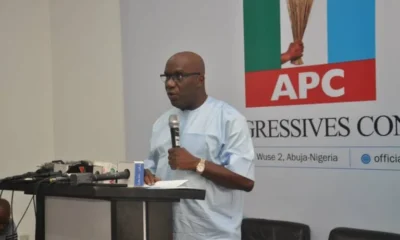
 BIG STORY4 days ago
BIG STORY4 days ago
 BIG STORY5 days ago
BIG STORY5 days ago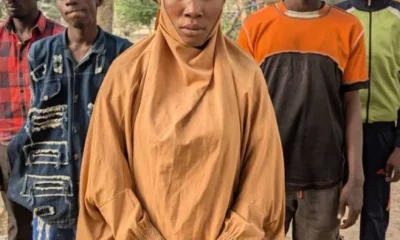
 BIG STORY4 days ago
BIG STORY4 days ago









